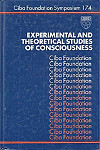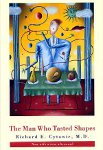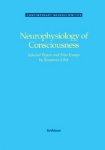Books on consciousness
A list of books relating to the hard problem of consciousness. Regularly updated cos I keep finding new stuff all the time.
A list of books relating to the hard problem of consciousness. Regularly updated cos I keep finding new stuff all the time.
1993
 Gregory R. Bock & Joan Marsh (eds.)
Gregory R. Bock & Joan Marsh (eds.)
Experimental and Theoretical Studies of Consciousness
(Wiley 1993)
The problem of how mental processes arise from physical ones has puzzled philosophers since at least Aristotle. Recent advances in neuroscience have enabled philosophers to phrase their hypotheses in precise biological terms, but are they any closer to explaining consciousness? This book contains contributions from philosophers representing several schools of thought. See Wiley | Amazon | Google
 Max Jammer
Max Jammer
Concepts of Space: The History of Theories of Space in Physics
(Dover 1993, 3rd edition)
A comprehensive, thought-provoking study and the first book to treat the idea of space in terms of its historical development. Jammer’s focus is on physical, rather than metaphysical, ideas of space; however, philosophical or theological speculations are discussed when relevant. Special attention is also given to the cultural settings in which the theories developed. See Amazon | Google
 Martin Davies & Glyn W. Humphreys (eds.)
Martin Davies & Glyn W. Humphreys (eds.)
Consciousness: Psychological and Philosophical Essays
(Blackwell 1993)
Consciousness is, perhaps, the aspect of our mental lives that is the most perplexing for both philosophers and psychologists. This collection of essays, many of which are published here for the first time, provides a state-of-the-art survey of recent work. The psychological essays have in common a concern with the functional effects of consciousness on behaviour. The philosophical essays distinguish several notions of consciousness and ask whether phenomenal consciousness—the “what it is like” aspect of experience—necessarily eludes a physicalist or functionalist description of the world. See Amazon
 Janet Wilde Astington
Janet Wilde Astington
The Child’s Discovery of the Mind
(Harvard 1993)
Sometime between the ages of two and five, children begin to understand that there is a difference between thoughts in the mind and things in the world, between thinking about eating a cookie and eating a cookie. This breakthrough reflects their emerging capacity to infer other people’s thoughts, wants, feelings, and perceptions from words and actions. “Mind” is a cultural construct that children discover as they acquire the language and social practices of their culture, enabling them to make sense of the world. Astington provides a valuable overview of current research and of the consequences of this discovery for intellectual and social development. See Harvard | Amazon | Google
 Quentin Smith
Quentin Smith
Language and Time
(Oxford 1993)
Offers a defense of the tensed theory of time, a critique of the New Theory of Reference, and an argument that simultaneity is absolute. Although Smith rejects ordinary language philosophy, he shows how it is possible to argue from the nature of language to the nature of reality. Specifically, he argues that semantic properties of tensed sentences are best explained by the hypothesis that they ascribe to events temporal properties of futurity, presentness, or pastness and do not merely ascribe relations of earlier than or simultaneity. See Oxford | Amazon | Google
 Robin Le Poidevin & Murray MacBeath (eds.)
Robin Le Poidevin & Murray MacBeath (eds.)
The Philosophy of Time
(Oxford 1993)
The first introductory anthology on the subject to appear for many years. The contributors are distinguished and two of the essays are specially written for this collection. In their introduction, the editors summarize the background to the debate and show the relevance of the philosophy of time for other branches of philosophy and for science. Part of the Oxford Readings in Philosophy series. See Amazon | Google
 Ruth Garrett Millikan
Ruth Garrett Millikan
White Queen Psychology and Other Essays for Alice
(MIT 1993)
This collection of essays is both an introduction to Millikan's much-discussed Language, Thought and Other Biological Categories (1984) and an extension of her central themes, especially in the philosophy of psychology. Millikan clarifies her views on mental representation, explores whether human thought is a product of natural selection, examines the nature of behavior as studied by the behavioral sciences, and discusses the issues of individualism in psychology, psychological explanation, indexicality in thought, what knowledge is, and the realism/antirealism debate. See MIT | Amazon | Google
 Richard E. Cytowic
Richard E. Cytowic
The Man Who Tasted Shapes
(MIT 1993)
In 1980, Cytowic was having dinner at a friend’s house, when his host exclaimed, “Oh, dear, there aren’t enough points on the chicken.” With that casual comment began Cytowic’s journey into the condition known as synesthesia. Extensive experiments with more than forty synesthetes has led him to an explanation of synesthesia – and to a new conception of the organization of the mind, one that emphasizes the primacy of emotion over reason. See MIT | Google (2003 edition)
 Howard Robinson (ed.)
Howard Robinson (ed.)
Objections to Physicalism
(Oxford 1993)
Physicalism has become almost an orthodoxy, especially in the philosophy of mind. Many, however, feel uneasy about this development, and this volume is a collective response to it. These papers, written by philosophers from Britain, the United States, and Australasia, show that physicalism faces enormous problems in every area in which it is discussed. See Oxford | Google
 Celia Wolf-Devine
Celia Wolf-Devine
Descartes on Seeing
(Southern Illinois U Press 1993)
Wolf-Devine traces the development of Descartes’ thought about visual perception against the backdrop of the transition from Aristotelianism to the new mechanistic science – the major scientific paradigm shift taking place in the seventeenth century. Throughout her discussion, she demonstrates both Descartes’ continuity with and break from the Aristotelian tradition. See Google | celiawolfdevine.com | Questia
 Arlette Streri
Arlette Streri
Seeing, Reaching, Touching
(MIT 1993)
Since antiquity, philosophers have asked whether seeing and touching are separate systems or are unified at birth. Contemporary psychologists approach the question from two perspectives: either they consider motor ability as the integrated link between the senses or they study the relations between the information gained from two or more sense modalities. Streri demonstrates that, although current research confirms both perspectives, the results are insufficient to provide an understanding of the conditions necessary for the establishment of a unity of the two systems. See MIT Press | Amazon | Google
 Austen Clark
Austen Clark
Sensory Qualities
(Oxford 1993)
Many philosophers doubt that one can provide any successful explanation of qualities that characterize how things look, feel, or seem to a perceiving subject. For one would need to explain qualitative facts in non-qualitative terms, and attempts to construct such an explanation seem doomed to failure. In this book, Clark presents an analysis of sensory qualities that refutes such skepticism. Drawing on work in psychophysics, psychometrics, and sensory neurophysiology, he analyzes the character and defends the integrity of psychophysical explanations of qualitative facts, arguing that the structure of such explanations is sound and potentially successful. See Oxford | Google | Amazon
 Gerald Edelman
Gerald Edelman
Bright Air, Brilliant Fire
(Basic Books 1993)
We are on the verge of a revolution in neuroscience as significant as the Galilean revolution in physics or the Darwinian revolution in biology. Edelman takes issue with the many current cognitive and behavioral approaches to the brain that leave biology out of the picture, and argues that the workings of the brain more closely resemble the living ecology of a jungle than they do the activities of a computer. See New York Times review by George Johnson | Amazon | Google Books
 Benjamin Libet
Benjamin Libet
Neurophysiology of Consciousness: Selected Papers and New Essays
(Springer 1993)
Collected here and annotated by the author are the key publications of Benjamin Libet, whose work during 30 years of exploring the human brain has helped establish a new basis for studying subjective mental phenomena. These papers present the results of experiments with awake human patients undergoing therapeutic surgical procedures. An invaluable collection for psychologists, psychiatrists, and neuroscientists, as well as those interested in the philosophy of consciousness. See Springer | Amazon

Experimental and Theoretical Studies of Consciousness
(Wiley 1993)
The problem of how mental processes arise from physical ones has puzzled philosophers since at least Aristotle. Recent advances in neuroscience have enabled philosophers to phrase their hypotheses in precise biological terms, but are they any closer to explaining consciousness? This book contains contributions from philosophers representing several schools of thought. See Wiley | Amazon | Google

Concepts of Space: The History of Theories of Space in Physics
(Dover 1993, 3rd edition)
A comprehensive, thought-provoking study and the first book to treat the idea of space in terms of its historical development. Jammer’s focus is on physical, rather than metaphysical, ideas of space; however, philosophical or theological speculations are discussed when relevant. Special attention is also given to the cultural settings in which the theories developed. See Amazon | Google

Consciousness: Psychological and Philosophical Essays
(Blackwell 1993)
Consciousness is, perhaps, the aspect of our mental lives that is the most perplexing for both philosophers and psychologists. This collection of essays, many of which are published here for the first time, provides a state-of-the-art survey of recent work. The psychological essays have in common a concern with the functional effects of consciousness on behaviour. The philosophical essays distinguish several notions of consciousness and ask whether phenomenal consciousness—the “what it is like” aspect of experience—necessarily eludes a physicalist or functionalist description of the world. See Amazon

The Child’s Discovery of the Mind
(Harvard 1993)
Sometime between the ages of two and five, children begin to understand that there is a difference between thoughts in the mind and things in the world, between thinking about eating a cookie and eating a cookie. This breakthrough reflects their emerging capacity to infer other people’s thoughts, wants, feelings, and perceptions from words and actions. “Mind” is a cultural construct that children discover as they acquire the language and social practices of their culture, enabling them to make sense of the world. Astington provides a valuable overview of current research and of the consequences of this discovery for intellectual and social development. See Harvard | Amazon | Google

Language and Time
(Oxford 1993)
Offers a defense of the tensed theory of time, a critique of the New Theory of Reference, and an argument that simultaneity is absolute. Although Smith rejects ordinary language philosophy, he shows how it is possible to argue from the nature of language to the nature of reality. Specifically, he argues that semantic properties of tensed sentences are best explained by the hypothesis that they ascribe to events temporal properties of futurity, presentness, or pastness and do not merely ascribe relations of earlier than or simultaneity. See Oxford | Amazon | Google

The Philosophy of Time
(Oxford 1993)

The first introductory anthology on the subject to appear for many years. The contributors are distinguished and two of the essays are specially written for this collection. In their introduction, the editors summarize the background to the debate and show the relevance of the philosophy of time for other branches of philosophy and for science. Part of the Oxford Readings in Philosophy series. See Amazon | Google

White Queen Psychology and Other Essays for Alice
(MIT 1993)

This collection of essays is both an introduction to Millikan's much-discussed Language, Thought and Other Biological Categories (1984) and an extension of her central themes, especially in the philosophy of psychology. Millikan clarifies her views on mental representation, explores whether human thought is a product of natural selection, examines the nature of behavior as studied by the behavioral sciences, and discusses the issues of individualism in psychology, psychological explanation, indexicality in thought, what knowledge is, and the realism/antirealism debate. See MIT | Amazon | Google

The Man Who Tasted Shapes
(MIT 1993)
In 1980, Cytowic was having dinner at a friend’s house, when his host exclaimed, “Oh, dear, there aren’t enough points on the chicken.” With that casual comment began Cytowic’s journey into the condition known as synesthesia. Extensive experiments with more than forty synesthetes has led him to an explanation of synesthesia – and to a new conception of the organization of the mind, one that emphasizes the primacy of emotion over reason. See MIT | Google (2003 edition)

Objections to Physicalism
(Oxford 1993)
Physicalism has become almost an orthodoxy, especially in the philosophy of mind. Many, however, feel uneasy about this development, and this volume is a collective response to it. These papers, written by philosophers from Britain, the United States, and Australasia, show that physicalism faces enormous problems in every area in which it is discussed. See Oxford | Google

Descartes on Seeing
(Southern Illinois U Press 1993)
Wolf-Devine traces the development of Descartes’ thought about visual perception against the backdrop of the transition from Aristotelianism to the new mechanistic science – the major scientific paradigm shift taking place in the seventeenth century. Throughout her discussion, she demonstrates both Descartes’ continuity with and break from the Aristotelian tradition. See Google | celiawolfdevine.com | Questia

Seeing, Reaching, Touching
(MIT 1993)
Since antiquity, philosophers have asked whether seeing and touching are separate systems or are unified at birth. Contemporary psychologists approach the question from two perspectives: either they consider motor ability as the integrated link between the senses or they study the relations between the information gained from two or more sense modalities. Streri demonstrates that, although current research confirms both perspectives, the results are insufficient to provide an understanding of the conditions necessary for the establishment of a unity of the two systems. See MIT Press | Amazon | Google

Sensory Qualities
(Oxford 1993)
Many philosophers doubt that one can provide any successful explanation of qualities that characterize how things look, feel, or seem to a perceiving subject. For one would need to explain qualitative facts in non-qualitative terms, and attempts to construct such an explanation seem doomed to failure. In this book, Clark presents an analysis of sensory qualities that refutes such skepticism. Drawing on work in psychophysics, psychometrics, and sensory neurophysiology, he analyzes the character and defends the integrity of psychophysical explanations of qualitative facts, arguing that the structure of such explanations is sound and potentially successful. See Oxford | Google | Amazon

Bright Air, Brilliant Fire
(Basic Books 1993)
We are on the verge of a revolution in neuroscience as significant as the Galilean revolution in physics or the Darwinian revolution in biology. Edelman takes issue with the many current cognitive and behavioral approaches to the brain that leave biology out of the picture, and argues that the workings of the brain more closely resemble the living ecology of a jungle than they do the activities of a computer. See New York Times review by George Johnson | Amazon | Google Books

Neurophysiology of Consciousness: Selected Papers and New Essays
(Springer 1993)
Collected here and annotated by the author are the key publications of Benjamin Libet, whose work during 30 years of exploring the human brain has helped establish a new basis for studying subjective mental phenomena. These papers present the results of experiments with awake human patients undergoing therapeutic surgical procedures. An invaluable collection for psychologists, psychiatrists, and neuroscientists, as well as those interested in the philosophy of consciousness. See Springer | Amazon
Menu
 What’s a logical paradox?
What’s a logical paradox? Achilles & the tortoise
Achilles & the tortoise The surprise exam
The surprise exam Newcomb’s problem
Newcomb’s problem Newcomb’s problem (sassy version)
Newcomb’s problem (sassy version) Seeing and being
Seeing and being Logic test!
Logic test! Philosophers say the strangest things
Philosophers say the strangest things Favourite puzzles
Favourite puzzles Books on consciousness
Books on consciousness Philosophy videos
Philosophy videos Phinteresting
Phinteresting Philosopher biographies
Philosopher biographies Philosopher birthdays
Philosopher birthdays Draft
Draftbarang 2009-2024  wayback machine
wayback machine
 wayback machine
wayback machine